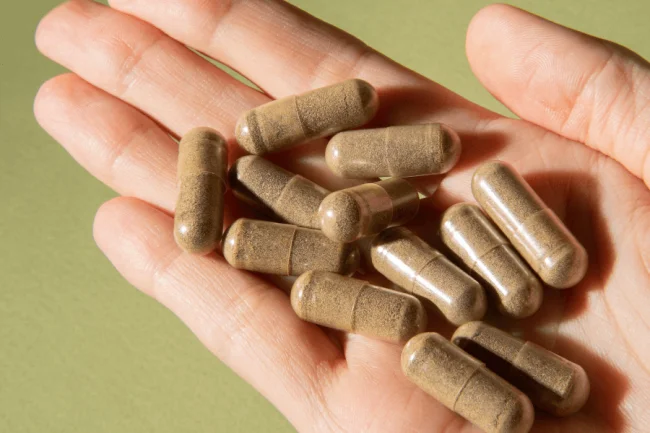Why Ginkgo Biloba?
Ginkgo biloba, often simply referred to as ginkgo, is a unique tree species known for its fan-shaped leaves and long history of medicinal use.
Native to China, ginkgo biloba is one of the oldest living tree species, with a lineage dating back over 200 million years. It’s often called a “living fossil” because it has no close living relatives.
Medicinal Uses of Ginkgo Biloba
Beneficial Effects on Memory and Cognition
Research has indicated that Ginkgo’s can modify cerebral blood flow and may help to reduce fatigue and inattention.
It’s also been noted for its neuroprotective effect in brain injuries and as a reinforcing antidepressant agent.
Another study highlighted that active components of Ginkgo’s might improve early cognitive recovery after an ischemic stroke.
These findings support the traditional use of Ginkgo biloba for cognitive and neurological benefits.
Support for Eye Health and Vision
Research indicates that Ginkgo’s antioxidant properties may improve blood flow to the optic nerve and retina, potentially providing an anti-inflammatory response that helps prevent eye degeneration and related vision issues. This could be beneficial in treating conditions like glaucoma
Alleviating Symptoms of Anxiety and Depression
A systematic review and meta-analysis found that Ginkgo biloba had a positive effect on patients with depression, showing improvements in various indicators such as the Hamilton
Depression Scale (HAMD) and brain-derived neurotrophic factor (BDNF) after 4, 6, and 8 weeks of treatment.
The study concluded that Ginkgo biloba might reduce the risk of depression or depressive symptoms with safe clinical efficacy
Management of High Blood Pressure
Ginkgo biloba may also be beneficial for managing high blood pressure.
By improving blood circulation and promoting the dilation of blood vessels, ginkgo can help lower blood pressure levels.
If you’re dealing with hypertension, ginkgo biloba could be a natural option to support cardiovascular health.
How to Take Ginkgo Biloba
When it comes to taking ginkgo biloba, it’s essential to follow recommended dosage guidelines to ensure safety and effectiveness.
Generally, doses range from 120 to 240 milligrams per day, divided into two or three doses.
It’s best to start with a lower dose and gradually increase it as needed, monitoring how your body responds.
Different Forms of Supplements Available
Ginkgo is available in various forms, including tablets, capsules, liquid extracts, and dried leaves.
The most popular form is tablets or capsules, which provide a convenient way to consume the herb.
Liquid extracts can be added to water or other beverages, while dried leaves can be used to make tea.
Choose the form that best fits your lifestyle and preferences.
Is Ginkgo Biloba Safe to Use?
Potential Drug Interactions to Be Aware Of
While ginkgo’s is generally safe for most people, it can interact with certain medications.
For example, ginkgo may increase the risk of bleeding when taken with blood-thinning medications such as warfarin or aspirin.
It can also interact with antidepressants, antipsychotics, and other medications.
Always consult with a healthcare provider before adding ginkgo biloba to your regimen, especially if you’re taking other medications.
Signs to Look for in Quality Supplements
When choosing a ginkgo’s supplement, look for products that are standardized to contain 24% flavone glycosides and 6% terpene lactones, the active compounds believed to provide health benefits.
High-quality supplements should be free from additives, fillers, and contaminants. Look for reputable brands known for their rigorous testing and quality control standards.
Possible Side Effects of Ginkgo Biloba
While ginkgo biloba is well-tolerated by most people, some may experience side effects.
Common side effects include headaches, dizziness, and stomach upset. To minimize these effects,
start with a lower dose and gradually increase it. Taking ginkgo with food can also help reduce stomach irritation.
When to Seek Medical Attention
In rare cases, ginkgo biloba can cause more serious side effects, such as allergic reactions, bleeding, or seizures.
If you experience symptoms like severe headaches, difficulty breathing, unusual bruising or bleeding, or seizures, seek medical attention immediately.
These side effects are uncommon but require prompt medical intervention.
Historical Uses and Significance
Historically, Ginkgo’s has been used in traditional Chinese medicine for thousands of years.
Ancient healers used ginkgo leaves and seeds for various ailments, believing in its ability to boost cognitive function and improve overall health.
Today, modern science has caught up, and ginkgo is widely recognized for its potential health benefits, available in numerous forms such as tablets, capsules, and teas.
Exploring New Research on Ginkgo Biloba
Research on ginkgo biloba is ongoing, with new studies exploring its potential benefits and applications.
Recent research has focused on its role in treating neurological disorders, improving cardiovascular health, and even its potential anti-cancer properties.
While more studies are needed to confirm these benefits, the preliminary findings are promising.
Novel Applications and Benefits Being Researched
Scientists are also investigating novel applications of ginkgo’s, such as its potential use in treating conditions like ADHD, tinnitus, and even sexual dysfunction.
As research continues, we may discover even more ways this ancient herb can support our health and well-being.
Conclusion
Ginkgo biloba is a powerful herbal supplement with a wide range of potential health benefits, from improving memory and cognitive function to supporting eye health and alleviating symptoms of anxiety and depression.
FAQs
What are the benefits of taking ginkgo biloba?
Ginkgo offers numerous benefits, including improved memory and cognitive function, support for eye health, alleviation of anxiety and depression symptoms, and management of high blood pressure.
Who should not take ginkgo biloba?
People taking blood-thinning medications, antidepressants, or antipsychotics should avoid ginkgo’s due to potential interactions. Pregnant or breastfeeding women should also consult with a healthcare provider before using ginkgo.
What happens if you take ginkgo biloba every day?
Taking ginkgo biloba daily, within recommended dosages, can provide ongoing support for cognitive function, eye health, and overall well-being. However, exceeding the recommended dose can lead to side effects.
Does ginkgo biloba help you sleep?
While ginkgo biloba is not typically used as a sleep aid, its ability to reduce anxiety and stress may indirectly improve sleep quality for some individuals. However, more research is needed to confirm this benefit.











